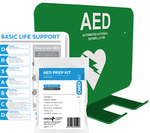Detailed MSPAINT Diagram of this deal: https://i.imgur.com/bLCzKh3.jpg
For the next week are throwing in a free wall bracket, life support chart and prep kit with any individual Defibrillator Purchase.
I'm happy to answer any defib related questions you may have, so leave them or your shocking puns in the comments.
Two defibs that are worth looking at!: The Lifepak CR2 Essential Automatic is designed for child and adult use with an inbuilt child mode, its $2010, our main competitor is charging $2077 standalone for it at the moment.
https://ddisafety.com.au/product/lifepak-cr2-essential-autom…
The Heartsine 500p has sensors that determine the quality of your CPR. It will give live feedback, telling you to "push harder or push faster." https://ddisafety.com.au/product/heartsine-pad500p/ $1860
with the free gear, and is $17 cheaper than our main competitor.


Huh?